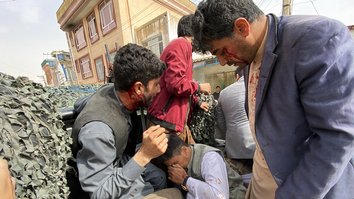KABUL -- The "Islamic State of Iraq and Syria" (ISIS) has claimed responsibility for a Monday (September 5) suicide bombing near the Russian embassy in Kabul that killed two staff from the diplomatic mission and four Afghans.
The bomber struck near the entrance of the embassy's consular section.
An ISIS fighter "blew up his suicide vest in a gathering attended by Russian employees" near the embassy, the group said in a statement that was circulated on various Telegram channels.
Afghanistan's Foreign Ministry confirmed the deaths of two embassy staff.
![Afghan women walk past the Russian embassy after a suicide attack in Kabul on September 5. [Wakil Kohsar/AFP]](/cnmi_pf/images/2022/09/07/36986-Russian-embassy-women-585_329.jpg)
Afghan women walk past the Russian embassy after a suicide attack in Kabul on September 5. [Wakil Kohsar/AFP]
Four Afghans waiting for consular services also were killed and several more were wounded, Kabul police said.
Kremlin spokesman Dmitry Peskov slammed the attack as "absolutely unacceptable".
Russian Foreign Minister Sergey Lavrov said immediate steps were taken to boost security at the embassy, located on one of Kabul's main roads leading to the parliament building.
Intelligence 'weakness'
The attack is a blow to Afghanistan's efforts to encourage foreign nations to reopen their Kabul missions, insisting security was guaranteed.
The Russian embassy was one of the few to remain open after August 2021, when most nations shut their embassies down and evacuated staff.
The Afghan Foreign Ministry said an investigation had been launched and authorities "will not allow the enemies to sabotage relations between both countries with such negative actions".
The attack showed Afghanistan's "weakness" in gathering intelligence, Afghan security analyst Hekmatullah Hekmat said.
"If they can't prevent such attacks in the heart of Kabul, then they can't provide security in the countryside," he told AFP.
United Nations (UN) Secretary-General António Guterres "strongly" condemned the attack and expressed his condolences to the victims and their families in a statement.
The UN Mission in Afghanistan (UNAMA) also condemned the bombing.
"UNAMA stresses the need ... to take steps to ensure the safety and security of the people as well as diplomatic missions," it said on Twitter.
Mosque bombings
Other terrorist violence has wracked Afghanistan in recent weeks.
On Friday, a suicide bomber struck one of western Afghanistan's biggest mosques in Herat city, killing at least 18 people, including its influential imam.
The cleric, Mujib ur Rahman Ansari, had called for those who committed even the "smallest act" against the country's leaders to be beheaded.
The attack against Ansari came despite authorities providing him with heavy security, including a bulletproof vehicle and bodyguards.
Several mosques across the country have been targeted this year, some in attacks claimed by ISIS.
At least 21 people were killed and dozens more wounded on August 17 when a blast ripped through Abu Bakr al-Sadiq Mosque in Kabul.
ISIS has targeted minority communities such as Shia, Sufis and Sikhs.
Earlier in August, ISIS claimed responsibility for a series of bombings that killed at least 10 people.
The explosions occurred in a west Kabul neighbourhood that is mainly inhabited by members of the ethnic Hazara community, who are mostly Shia.
The blasts came just days ahead of Ashura, when worshippers gather at mosques and take part in processions marking the death of the Shia Imam Hussein Ibn Ali, grandson of Prophet Muhammad.
In June, ISIS claimed an attack on a gurdwara in Kabul that left two dead and at least seven wounded.
In a message posted on its Amaq propaganda site, ISIS said the attack targeted Hindus and Sikhs and the "apostates" who protected them.

![Security guards stand along a road near the Russian embassy in Kabul after an ISIS suicide attack on September 5. [Wakil Kohsar/AFP]](/cnmi_pf/images/2022/09/07/36985-Russian-embassy-Kabul-585_329.jpg)






